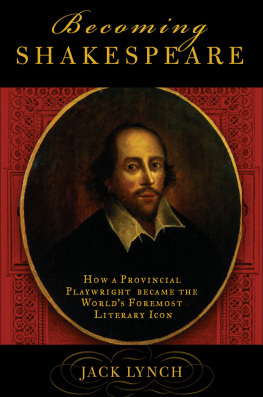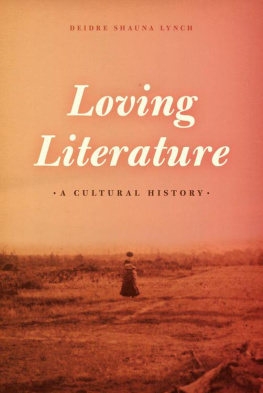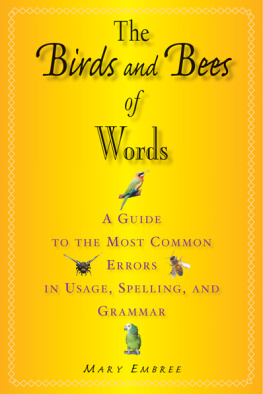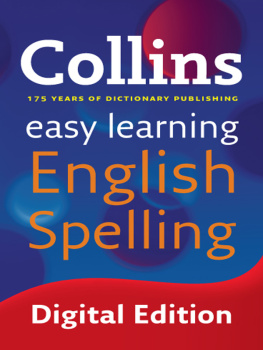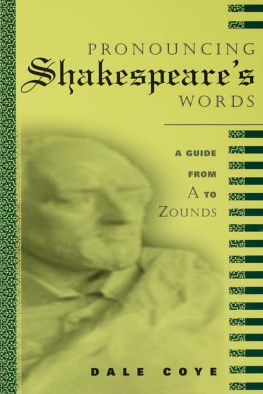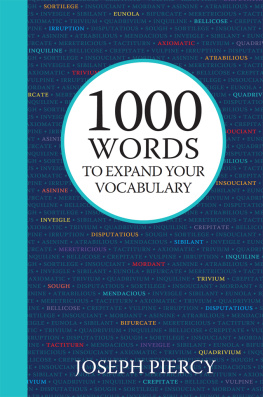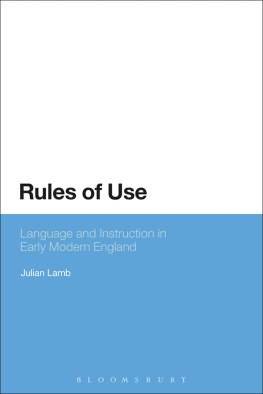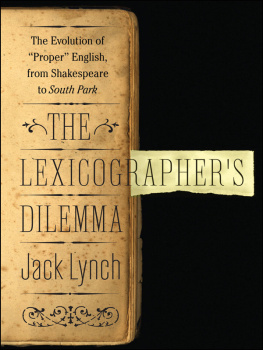THE
L EXICOGRAPHERS
D ILEMMA
The Evolution of Proper English,
from Shakespeare to South Park
JACK LYNCH

Copyright 2009 by Jack Lynch
All rights reserved. No part of this book may be used or reproduced in any manner whatsoever without written permission from the publisher except in the case of brief quotations embodied in critical articles or reviews. For information address Walker & Company, 175 Fifth Avenue, New York, NY 10010.
Published by Walker Publishing Company, Inc., New York
LIBRARY OF CONGRESS CATALOGING-IN-PUBLICATION DATA
Lynch, Jack (John, T.)
The lexicographers dilemma : the evolution of proper English from Shakespeare to
South Park / Jack Lynch.
p. cm.
Includes bibliographical references and index.
ISBN: 978-0-8027-1700-9 (hardcover)
1. English languageLexicography. 2. English LanguageHistory. 3. English
LanguageStyle. 4. English LanguageUsage. I. Title.
PE1611.L96 2009
423.028dc22
2009019195
First published by Walker Publishing Company in 2009
This e-book edition published in 2010
E-book ISBN: 978-0-8027-1963-8
Visit Walker & Companys Web site at www.walkerbooks.com
For three great teachers:
Bill Reinhart, Steve Dessants, David Jepson
Contents
Everybody complains about the language, but nobody does anything about itwell, almost nobody. This book is an account of some of the people who did try to do something about it. Its about the rise of standard English.
There is no need to define standard English, wrote educator George Sampson in 1921. We know what it is, and theres an end ont. We know standard English when we hear it just as we know a dog when we see it, without the aid of definition. But do we really know what it is?and if so, do we know how it got here? Even professional students of the history of the language are unclear on exactly what standard English means and how it came to be, and most of them only allude vaguely to the eighteenth-century grammarians who are supposed to have given us our modern notions of correctness and proper English.
This book poses a pair of questions: what does proper English mean, and who gets to say whats right? Our ideas of correct or proper English have a history, and we can learn about our language by reviewing that history. Todays debates over the state of the languagewhether about Ebonics in the schools or split infinitives in the Timesmake sense only in a historical context. This book looks back over the history of Modern English and traces the notion that some versions of the language are correct and others wrong. This is the story of the people who tried to fix or improve this messy language of ours.
A TYPICAL AMERICAN is expected to take a course in English for forty-five minutes a day, five days a week, thirty-four weeks a year, from the age of five to eighteen: that amounts to a lifetime of nearly 1,700 hours in the classroom, with many more hours outside it, learning the language that the overwhelming majority of American schoolchildren already spoke before they arrived at school. A college degree usually requires another three or four classroom hours a week for twenty-eight weeks in English composition, plus perhaps as much again in English literatureand thats for everyone, not just the English majors, who are expected to put in another four hundred or five hundred hours of class time on major English and American authors.
Since we spend so many hours being told whats right and wrong, we find it almost unthinkable that there was ever a time when proper English didnt exist. But when we look back about four hundred years, the linguistic world appears very different. The first impression that strikes a modern observer is chaos. We notice the capricious spellings right away. Here, for example, is a passage from Shakespeares Loves Labours Lost, as it appeared in the First Folio of 1623:
He draweth out the thred of his verbositie, finer then the staple of his argument. I abhor such phanaticall phantasims, such insociable and poynt deuise companions, such rackers of ortagriphie.... this is abhominable.
By modern standards, Shakespeares spelling is a mess: thred for thread, then for than, poynt for point, ortagriphie for orthography, and so on. And this little selection only hints at the anarchy of early modern spelling. The same word can be spelled several ways in a single poem. Shakespeare wasnt even consistent in spelling his own name.
Erratic spelling is just the beginning. By the standards of a modern ninth-grade grammar book, Shakespeare would be lucky to earn a C minus. His works are filled with gaffes no conscientious English teacher would permit in a student essay: double negatives (thou expectedst not, nor I looked not forRomeo and Juliet), mixed metaphors (take arms against a sea of troublesHamlet), split infinitives (thy pity may deserve to pitied beSonnet 142), sentence-ending prepositions (such stuff as dreams are made onHamlet), singular they (Theres not a man I meet but doth salute me, / As if I were their well-acquainted friendComedy of Errors), and who instead of whom as the object of a preposition (To who?King Lear). If his collected works were submitted in English 101, the instructor would feel obliged to cover his pages in red ink, scolding him for hundreds of blunders.
Does this mean Shakespeare was a subpar writer, undeserving of the place he occupies in the literary firmament? Not at all. Shakespeare did nothing wrongand not because he was some kind of rule-breaking rebel. Its not even because a genius like Shakespeare didnt need to follow rules, or because only those who know the rules can break them. Shakespeare didnt know the rules, but neither did anyone else in his day. The fact is that no one in 1600 ever imagined that the things we find troublesome in his writing might be problems. And even if Shakespeare wanted to get it right, there was no one around to tell him that, say, the most unkindest cut of all was a double comparative and therefore ungrammatical. There were no English dictionariesat least none we would recognize as dictionariesno grammar books, no guides to usage. Latin grammar and style were well documented, but English was mostly ignored by the scholars. There was no sixteenth-century equivalent of Fowlers Modern English Usage or Strunk and Whites Elements of Style. Writers had to make it up as they went along, with no one to tell them whether they were right or wrong.
THE RESULT of all this improvisation, as everyone knows, is a language that isnt the least bit ordered, tidy, or rational. If some Intelligent Designer were to sit down to plan a language, surely HeShe? It?wouldnt have created this tangled mess we call English. If the language were logical, the verb to dust wouldnt mean both remove dust from (as in dust the bookcase) and add dust to (as in dust the cookies with powdered sugar). The noun oversight wouldnt mean both careful scrutiny (as in they agreed to submit to the oversight of the committee) and neglectful inattention(as in they lost everything because of an oversight). Cleave shouldnt mean both stick together and cut apart; bimonthly shouldnt mean both twice a month and every other month. But they do. The verbs loose and unloose shouldnt mean the same thing, nor should




